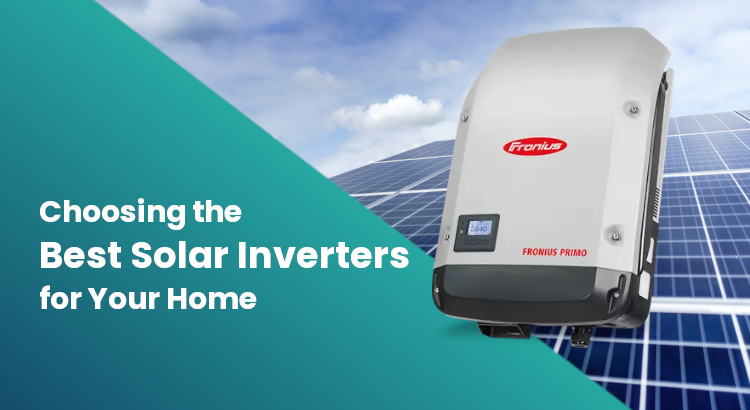Choosing the Best Solar Inverters for Your Home

Selecting the best solar inverter for your residential or commercial needs is a significant decision. This article aims to guide you through the essential factors to consider when making this choice.
What Is the Importance of Solar Inverters?
A crucial component of any solar power system is the solar inverter, which converts the direct current (DC) generated by solar panels into the alternating current (AC) needed to power electrical appliances and feed excess electricity into the grid.
They also optimize energy output, facilitate grid interaction, and ensure system safety. They play a crucial role in solar power system efficiency and reliability.
Tips to Pick the Best Solar Inverter
Take a look at some useful tips to help you choose the top solar inverter.
1. Efficiency and Performance
Efficiency is a paramount factor when choosing a solar inverter. The efficiency rating of an inverter indicates how effectively it can convert solar energy into usable electricity. Look for inverters with efficiency ratings above 95%, ensuring maximum power generation from your solar panels over the system’s lifespan.
Additionally, consider the inverter’s performance under different weather conditions, such as extreme heat or shade, to ensure optimal energy production throughout the year.
2. Inverter Type
There are three main types of solar inverters: microinverters, string inverters, and power optimizers.
Microinverters
They are situated behind each solar panel, facilitating individual power conversion.
Example: Enphase inverter
String Inverters
They link multiple solar panels in series to convert the collective DC power generated by the entire string.
Examples: Fronius, SMA, Huawei, Sungrow, and GoodWe inverters
Power Optimizers
They work similarly to microinverters but optimize the performance of each panel before sending power to a central inverter.
Examples: SolarEdge and Tigo optimizer
Consider your specific requirements, budget, and system design when choosing the most suitable inverter type for your solar installation.
3. Warranty and Service
Solar inverters are long-term investments, so it’s crucial to choose a reliable product backed by a solid warranty and excellent customer service. Look for inverters with warranties of at least 5 to 10 years, as this demonstrates the manufacturer’s confidence in their product’s quality.
Examine the manufacturer’s reputation and see if local support and services are offered where you live. A reliable warranty and strong customer support can save you from unexpected repair costs and provide peace of mind throughout your solar system’s lifespan.
4. Grid Requirements and Standards
Ensure that the solar inverter you choose complies with all relevant standards, certifications, and grid connection requirements. For example, inverters must meet the AS4777 standard, covering grid connection of energy systems.
Non-compliance may render your system ineligible for government incentives or grid connection. Always consult with a qualified solar installer or electrician to ensure compliance with government regulations.
5. Monitoring and Data Accessibility
Many modern inverters come with built-in monitoring systems that allow you to track the performance of your solar power system. Monitoring provides valuable insights into energy production, consumption, and system health.
Consider the level of monitoring and data accessibility when choosing an inverter. Advanced features like real-time monitoring via mobile apps or web portals enable you to monitor your system’s performance remotely, enhancing your ability to optimize energy consumption and identify issues promptly.
6. Cost and Budget
Although it shouldn’t be the only determining factor, cost must be taken into account. The cost of solar inverters varies based on its features, capacity, and kind. Analyze your budget and find a balance between the short- and long-term advantages.
Investing in a high-quality inverter from a reputable manufacturer may incur higher initial costs, but it could result in better performance, reliability, and a longer lifespan, ultimately providing a higher return on investment over time.
Conclusion
Choosing the best solar inverter for your home involves a careful consideration of several factors. By thoroughly assessing those aspects, you can make an informed decision that aligns with your energy needs, financial considerations, and long-term sustainability goals. Remember to consult with qualified professionals for personalized advice and to ensure your solar power system complies with all relevant regulations.
Tags: solar inverters
